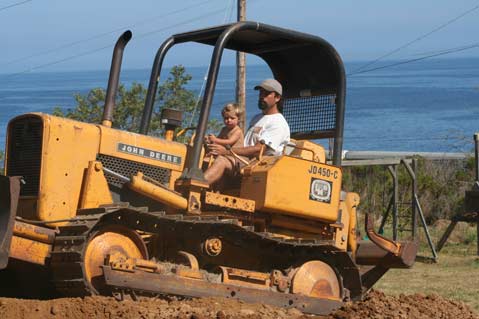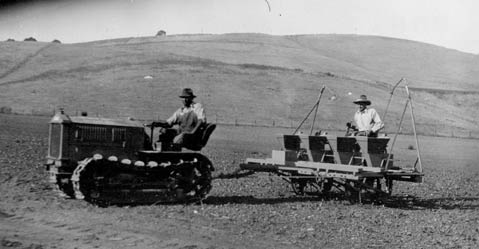Sustainability Plows Ahead
Orella Family Ranch to Host S.B.'s First Carbon Economy Series

There is no way around it-the world isn’t feeling very well. The giant-sized, carbon footprint fallout growing since the Industrial Revolution is falling upon us by wreaking havoc on global weather patterns, melting ice caps, acidifying our oceans, smogging our sunsets, and filling our days with forecasts of continued doom and gloom. Even here in the beautiful south-facing bubble of Santa Barbara, the anecdotal evidence is stacking up: Two weeks ago we went from a historic mid-October rainmaker that dropped nearly 10 inches of rain on San Marcos Pass in less than 24 hours to, just one day later, scorching temperatures on the streets of downtown S.B. But before you surrender to that growing feeling of helplessness and build a bunker to prepare for the end of days, look to the hope that sparkles on the horizon. Echoing a movement that’s growing the world over, a small, family-run ranch on the Gaviota Coast is looking to provide daily doses of clean living that might be our last chance of getting out of the mess we are in. As Orella Ranch resident Dave Fortson put it recently, “Being sustainable is no longer a luxury, it is a matter of survival.”

Nestled a short distance east of Refugio State Park, the roughly 300-acre Orella Ranch is owned and operated by the descendents of Bruno Orella, who bought the land from original Spanish land grant holder Juan Camarillo more than 150 years ago. From dry farming foods like lima beans and tomatoes, to running cattle operations and wood mills, the ranch has endured for generations. Nowadays, the ranch is run by Bruno’s bloodline relative Mark Tautrim and, to an ever-increasing degree, his son Guner (who was one of 11 people appointed last week to the county’s newly created Gaviota Planning Advisory Committee) and daughter Kimberly. The latter two, along with their families, have helped usher in a new age on the ranch by developing a type of hybrid model that exemplifies what it takes for a family-run ranch to not just survive but thrive in this age of economic woe, crippling property and inheritance taxes, scarce water, and the ever-present beast of big-business farming.
During the past three years, the ranch has been re-imagining its future with one foot planted firmly in the tenets of sustainability and the other in the hard-working tradition of agriculture. Specifically, Orella has slowly and temporarily phased out cattle operations in order to better assess the keyline potential of the land. (This centuries-old plowing technique follows elevation contours during pasture and crop planning phases as opposed to the more traditional straight furrow approach.) The farm has also developed a greenhouse nursery for native trees, reached out to UCSB’s Bren School to help develop a living laboratory that will provide both baseline and ongoing scientific assessments, collaborated with John Givens Farms to produce acres of market-grade organic tomatoes, and-perhaps most importantly for the Santa Barbara community-begun serving as a forum (working in conjunction with Ojai’s Quail Springs) for some of the brightest minds in the sustainability universe to provide hands-on instructional workshops on everything from natural building techniques to water harvesting. “We aren’t saying we are some sort of sustainability masters. We are just a working ranch with the vision of a sustainable model.” Explains Guner Tautrim, “The idea is to bring out the world’s experts on the subject, host them, listen to what they have to say, and learn how to do it right.”
To that end, Orella Ranch is the site of Santa Barbara’s first-ever Carbon Economy Series this weekend. With an emphasis on self-reliance and “re-localizing” agriculture in a carbon-conscious way, the four-part series will be an unprecedented gathering of luminaries and hands-on workshops for not only the Santa Barbara region but for the West Coast at large. Offering daily participation or an “overnight” package that includes camping and home-cooked meals on the historic coastal ranch, the series starts on October 30 with Dr. Elaine Ingham’s three-day soil, food web, and composting technologies course. A soil microbiologist by trade with more than 30 years of experience, Ingham-who is director of research at Soil Food Web Inc.-will be providing a nitty-gritty presentation on the intricacies of dirt and the various ways one can improve it via homegrown fertilizers and compost without stepping on the toes of surrounding ecosystems.
The second installment of the series runs November 10-15 and focuses on sustainable land use management techniques like water conservation, soil building, grazing, and general long-range planning. Kirk Gadzia, author of Rangeland Health, will be handling the first half of the week, while renowned Australian permaculture guru Darren Doherty will be talking during the second half about keyline design. He will also teach attendees how to drought-proof farms, deepen top soils, and maximize what little rain we get every year here on the South Coast.
Gunter Pauli, one of the most respected names in the carbon-conscious movement, will be presiding over the series’ third event, Zero Emissions Research and Initiative (ZERI). Named after Pauli’s think tank at the United Nations University in Tokyo, the three-day course (which also features an open-to-the-public speaking engagement at Santa Barbara City College on December 5) will address one of the most basic and biggest problems facing wide-spread greening: money. The old model of sustainability requires you to invest more money up front, save some after the fact, and hope to break even over the long run with the hard-bit bottom line cushioned only by the peace of mind earned by going green. ZERI works to evolve this model by predicating itself on a mindset of abundance (think raw materials and the world around us) rather than the traditional “lack of” way of thinking. A highly synthesized and holistic sort of economic philosophy, Pauli’s course looks to bring synergy to various aspects of life in such a way that the whole becomes more powerful than any of the individual parts.
The final part of the series-which will take place on December 10 and 11 with a public talk on December 9 at the Faulkner Gallery-will be taught by re-localizing expert Joel Salatin. A featured farmer in Michael Pollan’s popular book The Omnivore’s Dilemma and the film Food, Inc., Salatin will be preaching the powers of investing in the local production of food, energy, and goods and how to navigate the pitfalls, both political and practical, that you encounter along the way.
“This is really just a great chance to arm yourself with knowledge,” summed up ranch resident Dave Fortson, who lives on Orella with his family and has been a chief architect in putting the series together. Acknowledging that buzz words like “sustainable” and “permaculture” instantly create barriers with many long-time ranchers and agriculturists, Fortson points to emerging partnerships-with folks from the Hollister Ranch, the Cattlemen’s Association and, to a lesser degree, the Santa Barbara County Farm Bureau-as signs of a world that is more receptive to the lessons coming out of the Orella Ranch in the coming weeks than ever before. “Santa Barbara County, probably as much as anywhere in the world, can turn inward and provide our own food, fiber, and fuel. We don’t need to be dependent on the Mid-East let alone the Midwest. We just have to break down those walls,” said Fortson, before adding, “and that is exactly what we hope this Carbon Economy Series can begin to do.”
4•1•1
The revolution starts this weekend. For more info go to carboneconomysb.com.



